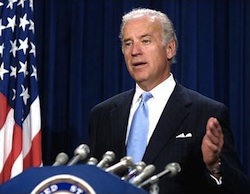Biden to Outline Obama Administration's Nuclear Security Agenda
February 8, 2010
Featured Image
We are happy to serve you a daily summary of the day's top nuclear policy stories each morning, with excerpts from the stories in bullet form.
Stories we're following today:
Biden Outlining Atomic Agenda - Politico [link]
- Vice President Biden plans to give a speech this Wednesday on the administration's agenda for nuclear security.
- Outlining the future of the American nuclear deterrent, Biden will address "how the Administration's budget request and other efforts will support the President's vision of reducing the nuclear dangers facing our country as we pursue the peace and security of a world without nuclear weapons," according to guidance distributed to reporters.
Russia and U.S. Lead Calls to Reduce Nuclear Arsenals - New York Times [link]
- For many years, the Munich Security Conference has been dominated by rivalry and suspicion between Russia and the United States.
- But at the conference this weekend, the atmosphere was markedly different. On arms control, both sides tried to determine whether it was at all possible for President Barack Obama to realize his vision of a world without nuclear weapons.
- “In a new international landscape, the role of nuclear weapons has changed,” said Richard Burt, chairman of the Global Zero Initiative in Washington and a veteran U.S. arms control negotiator.
- “For better or for worse, nuclear weapons contributed to stability through deterrence,” Mr. Burt told the Munich audience. “But now there is the competition between the forces of integration and the forces of disintegration, making the world a more dangerous place.”
Iran Tells UN Agency of Nuclear Enrichment Plans - New York Times [link]
- Officials from the United States, France and Russia called Monday for stronger measures against Tehran after Iran told the United Nations nuclear watchdog agency that it would begin enriching its stockpile of uranium to power a medical reactor in Tehran.
- Several of the world powers dealing with Iran’s nuclear issue are in favor President Obama’s call for tougher sanctions, but China has said such action could forestall a diplomatic solution to the nuclear crisis.
- On Monday, Iran’s ambassador to the International Atomic Energy Agency in Vienna, Ali Asghar Soltanieh, delivered a letter to the agency setting out the plan to begin enriching its stockpile to 20 percent purity, news reports said, after President Mahmoud Ahmadinejad personally ordered his atomic scientists on Sunday to begin the process.
- By notifying the I.A.E.A., Tehran seemed to be taking a step further in its brinkmanship with world powers led by the United States, which is seeking a broad international consensus on tighter economic sanctions against Iran.
START Exposing Divide Among Conservatives - Max Bergmann in the Wonk Room [link]
- A split within the conservative movement is becoming more and more apparent as the US and Russia come close to finalizing a new START treaty that will cut nuclear arsenals.
- At issue here are two competing world views. On the one hand, there are the neocons like Bolton, that insist that the US should actually begin engaging in a new nuclear arms race to stop countries from thinking we are weak, as well as out of a bizarre notion that the Cold War never ended.
- On the other hand, there are the realist conservatives like Powell and Kissinger, that argue that nuclear weapons have become militarily useless and that if nothing is done to eliminate nuclear weapons, the world will move quickly in the opposite direction toward a nuclear tipping point, in which proliferation cascades and which the threat of nuclear terrorism becomes ever more likely.
- Hence, the ratification fight over START is not really one between progressives and conservatives. Progressives are in agreement with Republicans like Powell, Kissinger, and Schultz. Instead, the ratification fight is between conservatives.
The Road to 'Global Zero': An Interview with Her Majesty Queen Noor - Plutonium Page in Daily Kos [link]
- "One really has to look at what ways the resolution of tension and conflicts in different regions can be advanced, because that is going to have an enormous impact on the willingness of states to give up nuclear arsenals that were developed in response, or in competition with, neighbors, and, unfortunately, in all too many states, have become a source of national pride. We have to de-glorify these weapons that really provide no security, and are a source of increasing insecurity, as nuclear materials proliferate more and more widely."
- "It will be a long, hard, road. No one thinks this will be easy. But there is a Victor Hugo quote, 'There is one thing stronger than all the armies in the world, and that is an idea whose time has come.'"
Book Review: "Bomb Power" by Garry Willis - George Perkovich in the Washington Post [link]
- Gary Wills begins his provocative account of the atomic bomb's impact on the republic with a high-detonation assertion. "The Bomb," he writes, "altered our subsequent history down to its deepest constitutional roots," redefining the presidency in ways that the Constitution does not intend.
- Wills is certainly right that the bomb poses profound challenges to American constitutional governance. Congress's sole authority to authorize war is difficult to reconcile with the five minutes in which a president would have to decide whether to order the launch of nuclear weapons if the United States were under missile attack.
- Having illuminated these dangers, "Bomb Power" regrettably does not point the way to remedies. The bomb is no longer the solution to the most pressing challenges facing the United States, if it ever was. Cooler heads are now needed to act on the alarm that Wills sounds.



